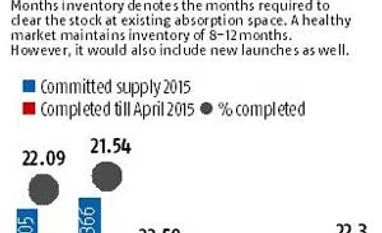Home supply delay a reality this year too
Only 22% of 7,32,238 residential units completed by April 2015
)
Only 22 per cent of the 732,238 residential units committed for 2015 in major cities have been delivered by April, according to industry estimates. Delivery delays are likely to continue in the realty sector.
According to the data provided by real estate consultancy firm PropEquity, around 161,069 units were delivered during January-April 2015 in 13 cities, including the National Capital Region, Mumbai, Bengaluru and Pune. In 2014, 278,854 units were delivered during the year, 47 per cent of the 581,907 committed units.
Delays in delivery have also resulted in an inventory pile-up.
Data from research firm Liases Foras shows 71 months of inventory in the National Capital Region (NCR), followed by 46 months in the Mumbai Metropolitan Region (MMR) and 36 months in Chennai for the January-March quarter. Inventory is the number of months needed to clear the stock at the existing absorption rate. A healthy market maintains eight to 12 months of inventory.
Buyers have faced significant delays by most developers in the country over the past couple of years. Many projects have been delayed by up to four years. Even prominent developers have fallen back on delivery commitments due to liquidity issues and delayed approvals.
Samir Jasuja, founder and chief executive officer, PropEquity, said liquidity and oversupply were the culprits.
According to the data provided by real estate consultancy firm PropEquity, around 161,069 units were delivered during January-April 2015 in 13 cities, including the National Capital Region, Mumbai, Bengaluru and Pune. In 2014, 278,854 units were delivered during the year, 47 per cent of the 581,907 committed units.
Delays in delivery have also resulted in an inventory pile-up.
Data from research firm Liases Foras shows 71 months of inventory in the National Capital Region (NCR), followed by 46 months in the Mumbai Metropolitan Region (MMR) and 36 months in Chennai for the January-March quarter. Inventory is the number of months needed to clear the stock at the existing absorption rate. A healthy market maintains eight to 12 months of inventory.
Buyers have faced significant delays by most developers in the country over the past couple of years. Many projects have been delayed by up to four years. Even prominent developers have fallen back on delivery commitments due to liquidity issues and delayed approvals.
Samir Jasuja, founder and chief executive officer, PropEquity, said liquidity and oversupply were the culprits.
“The liquidity crunch impacts projects in the middle of construction and the oversupply situation is deterring developers from launching new projects,” Jasuja added.
Experts said despite low sales, residential property prices had not seen a major decline over the last couple of years. At most, prices are flat and there is scope for a correction.
“Listed players are under pressure to show yearly revenue and are likely to reduce prices in upcoming developments. Overpriced markets like the NCR and MMR are expected to witness some correction. Prices in the south are expected to appreciate three per cent to six per cent over the next six to eight quarters,” Jasuja said.
Developers have been offering discounts to push sales, but these have not helped. Although sentiment turned positive after the new government assumed office in Delhi, there has been no increase in activity. Some developers have been able to sell their projects because of a good mix of pricing and location.
Jasuja added home loan rates were still high despite inflation subsiding. “In a scenario where the monsoon remains normal, leading to moderate inflation, we can see a revival after three to five quarters,” he said.
More From This Section
Don't miss the most important news and views of the day. Get them on our Telegram channel
First Published: Jul 16 2015 | 12:46 AM IST


